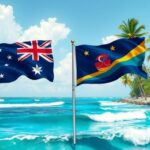Politics
AUSTRALIA, BILATERAL AGREEMENTS, CON, CONROY, CUBA, GEOPOLITICS, GREEN ENERGY, INTERNATIONAL RELATIONS, KIRSTY NEEDHAM, LOWY INSTITUTE, NEW ZEALAND, NORTH AMERICA, OCEANIA, PAT CONROY, REUTERS, REUTERS AUSTRALIA, SOUTH CHINA SEA DISPUTE, SOUTH PACIFIC, TASMAN SEA, TRADE, TRUMP, U. S. AGENCY FOR INTERNATIONAL DEVELOPMENT, USAID, VANUATU
Nia Simpson
Australia Strengthens Ties with Vanuatu Amid Growing Regional Competition
Australia pledged to remain the South Pacific’s largest aid donor during discussions with Vanuatu, providing AU$3.2 million in support following an earthquake. Minister Pat Conroy emphasized Australia’s historical presence in the region amidst rising competition from China and concerns over U.S. aid cuts. Vanuatu’s increasing ties with China and ongoing political instability highlight the complexities of regional security and economic cooperation.
Australia has reaffirmed its commitment to remaining the principal aid donor in the South Pacific during security and economic discussions with Vanuatu. Minister for International Development, Pat Conroy, emphasized Australia’s ongoing support, stating, “Australia will always be there for you,” following a meeting with Prime Minister Jotham Napat in Port Vila. In light of recent events, Australia has pledged an additional AU$3.2 million in direct budget assistance to Vanuatu after an earthquake devastated the region in December, resulting in significant loss of life and infrastructure.
During the talks, Conroy acknowledged the growing geostrategic competition in the Pacific, particularly due to heightened interest from major powers. He remarked, “There is geostrategic competition occurring in the Pacific as great powers get interested in our region, but we are proud to be the biggest development partner.” He further noted that Australia has maintained its presence in the Pacific well before other nations such as the United States and China.
China has emerged as the second-largest bilateral donor to the Pacific Islands after Australia, as outlined in a November 2024 report by the Lowy Institute. This growing influence has elicited concern from both Australia and the United States, particularly following President Trump’s directives to reduce foreign aid, which have raised apprehensions among the Pacific island nations regarding potential developmental impacts.
Amid this backdrop, Australian officials are closely monitoring the ramifications of U.S. funding cuts to the U.S. Agency for International Development (USAID) on the region. In recent developments, Vanuatu has deepened its ties with China, which has become its largest external creditor due to substantial loans for infrastructure projects. Additionally, China’s naval activities, including live-fire drills in the Tasman Sea and frequent port visits to Vanuatu, have further heightened tensions.
Furthermore, a security treaty between Australia and Vanuatu, established in 2022, remains unratified by Vanuatu’s parliament, which has faced considerable political instability. Prime Minister Napat, who has been in office during a tumultuous period marked by frequent changes in leadership, indicated that discussions with Australia included topics of economic collaboration and security.
In conclusion, Australia has reaffirmed its role as the leading aid donor in the South Pacific amid rising competition from China. The commitment to support Vanuatu, particularly in light of recent natural disasters, underscores Australia’s dedication to the region’s stability. However, concerns regarding China’s growing influence and the implications of potential U.S. foreign aid cuts remain pivotal issues that will shape future dynamics in South Pacific geopolitics.
Original Source: www.rnz.co.nz








Post Comment